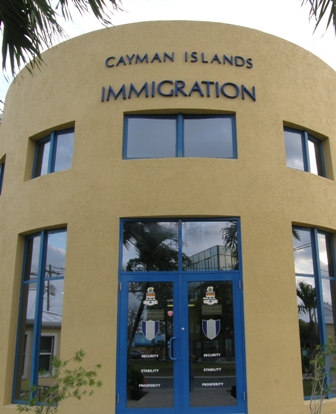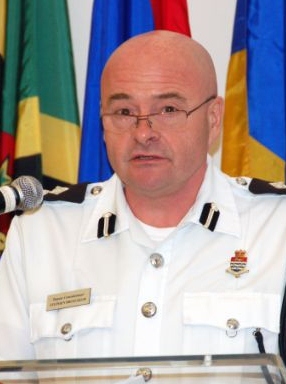Archive for June 19th, 2012

Key wrong way to choose
 (CNS): The key employee mechanism creates “an artificial vetting system” for choosing who should get to stay in Cayman because it is controlled by employers and unfair to employees. In a new report the Term Limit Review Committee (TLRC) has recommended that government abolish the key employee policy and give everyone who wants to stay the right to apply for permanent residency once they reach their eighth year. The committee says that the criteria used to select who should get PR needs to be in line with government objectives and more transparent. The TLRC has recommended that government maintain a 10 year fixed term for those refused PR with a genuine break in stay of at least one year.
(CNS): The key employee mechanism creates “an artificial vetting system” for choosing who should get to stay in Cayman because it is controlled by employers and unfair to employees. In a new report the Term Limit Review Committee (TLRC) has recommended that government abolish the key employee policy and give everyone who wants to stay the right to apply for permanent residency once they reach their eighth year. The committee says that the criteria used to select who should get PR needs to be in line with government objectives and more transparent. The TLRC has recommended that government maintain a 10 year fixed term for those refused PR with a genuine break in stay of at least one year.
The committee, which was formed last year, submitted its comprehensive report to government last month, which was made public by the premier on Friday in the Legislative Assembly. McKeeva Bush said that Cabinet had not yet accepted or discussed the recommendations as he said it wanted more input and feedback from the public.
“Given the high profile nature of this subject and to ensure openness and transparency within my government, I am tabling this report today in order to provide the public with an opportunity to review and provide comments,” he said.
He added that he had asked the committee to produce a draft National Population Growth Strategy that will set out the minimum size of the population and the required annual growth, skill sets and expertise that are required and a projected demographic mix of the population.
In the report the committee said government still needed a fixed term policy of some kind in order to prevent people becoming long term social and economic burdens to the country as it recommended a ten year limit, allowing all those who stay the chance to get PR via a clearer system. The team said that the key employee policy was unsatisfactory as it allowedemployers to choose who should stay and so far only a very small percentage of the workforce has passed through the key filter, which may have prevented suitable people from being given the chance to apply for PR.
They report suggests that all workers should be able to apply for the right to reside permanently in Cayman between year 7 and 8 on a points system that meets the country’s economic and social objectives. The committee also recommends that the ten year system apply to public sector workers as well to ensure there is a level playing field.
The changes will require sufficient funding for the immigration department so it can attract and hire sufficiently well-qualified personnel to carry out the work that will be required under the system to ensure PR applications are handled in a timely manner.
The public also need to be properly educated about the government’s overall immigration strategy, while at the same time promoting the training and upward mobility of Caymanians. Those coming to work in Cayman must also understand the fixed-term policy and the criteria on which long-term residency can be acquired. The workers must understand that the break in stay will be considered a legal break in their residence and will disallow the right to apply to permanently reside until they once again attain the qualifying period if they return to the islands after the break.
The team said government needs to settleon a policy for the long run which provides certainty and predictability for employer and employee and which avoids the uncertainty of constantly moving goalposts.
The public is being asked to submit comments on the report, which is available at the Legislative Assembly, within the next 30 days. Comments on the report can be sent to tlrc@gov.ky.
Read full report: Report of the Term Limit Review Committee (TLRC).pdf

Small nations challenged in crime fight
 (CNS): Deputy Commissioner of Police Stephen Brougham said some of the challenges of forensic evidence gathering for small Caribbean nations included cross-contamination when evidence is sent overseas. Speaking at the first meeting of regional public prosecutors in Cayman last week, the senior cop said that some serious cases had been lost in Cayman’s courts recently when gunshot residue and DNA evidence was thrown because of the potential of contamination. Even in relatively simple cases, Brougham said, evidence might have to be shipped to three to four different laboratories and experts, introducing added problems for law enforcement officials.
(CNS): Deputy Commissioner of Police Stephen Brougham said some of the challenges of forensic evidence gathering for small Caribbean nations included cross-contamination when evidence is sent overseas. Speaking at the first meeting of regional public prosecutors in Cayman last week, the senior cop said that some serious cases had been lost in Cayman’s courts recently when gunshot residue and DNA evidence was thrown because of the potential of contamination. Even in relatively simple cases, Brougham said, evidence might have to be shipped to three to four different laboratories and experts, introducing added problems for law enforcement officials.
The issue of the need for more reliable forensic evidence in order to secure convictions for serious crime was one of the main issued highlighted at last week’s newly formed Caribbean Association of Prosecutors two-day workshop, which was designed to provide insights into forensic science and trans-national crimes. Twelve experts from the UK, Canada and the Eastern Caribbean provided the training to take forward the workshop’s theme: 'Enhancing the Effectiveness of Prosecutors in a Challenging Environment'.
There were 63 participants from some 19 territories and countries from the region. Speakers at the opening ceremony highlighted the need for more reliance on non-eyewitness evidence for use in court cases because of increasing reluctance of witnesses to come forward and the threats to those who do.
Governor Duncan Taylor said the challenge of serious crime that Caribbean countries face is compounded by the economy of scale in small nations which limits forensic growth, as he welcomed the association taking a collaborative approach to improving effectiveness in fighting and prosecuting crime.
Cayman’s Director of Public Prosecutions, Cheryll Richards, said this new association provided members with continuing education opportunities to better perform their jobs.
Cayman’s hosting of the first such workshop was the outcome of joint collaboration of the Eastern Ontario Regional Forensic Pathology Unit, the Commonwealth Secretariat and the OTD Criminal Justice Office of the British Consulate-General in Miami.